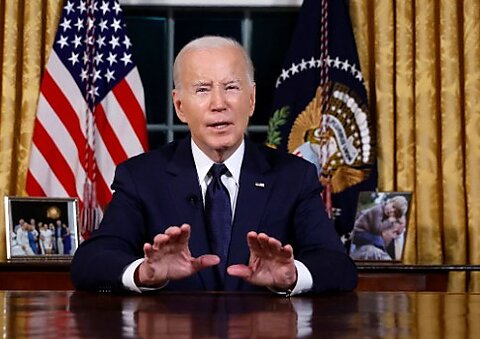
Emergency Aid or Budget Trick? Assessing Biden’s $100 Billion Spending Request
Jordan Cohen and Dominik Lett
The Biden administration is asking for a $100 billion supplemental spending package for Israel, Ukraine, Indo‐Pacific allies, border security, and more. This legislation would evade spending limits agreed to back in May and spend future taxpayer money that is not necessarily in US interests. By tying together more than a dozen separate issues, this request uses an all‐or‐nothing approach.
Congress should reject tying together fundamentally unrelated priorities and consider the Israel emergency request as a standalone. If Ukraine, Indo‐Pacific allies, border security, or any other issue merits additional funding, they should be considered as part of the ongoing appropriations process.
Biden’s latest emergency funding request arose after the atrocities committed by Hamas against Israel in early October. The administration has framed Israel’s need for military assistance as an emergency and has requested $14 billion in Israel‐related assistance. The attacks by Hamas and Israel’s military retaliation certainly demand an urgent response, but the current military situation does not justify a massive surge in emergency military aid.
Israel’s early bombing campaign has forced Hamas underground and on its heels. To achieve its mission of ending Hamas, Israel will need to fight through Hamas’s extensive tunnels and in an area where the Israel Defense Forces are more unfamiliar with the territory than their opposition.
In its most limited version, this war will be an isolated ground invasion where Israel uses ground sensors, navigation technology, and ground‐penetrating munitions alongside armed troops to fight a war against Hamas in the terrorist organization’s tunnels. In this scenario, Israel needs few weapons from US stockpiles.
The weapons it does need do not require extra spending on the defense industrial base and tend not to be in limited supply or in high demand with other partners, like Ukraine and Taiwan.
Take “bunker buster” munitions like GBU‐28s. Israel will need these specialized bombs to penetrate Hamas’s tunnels. But neither Taiwan nor Ukraine require them, the US has some available in its inventory, and they are not particularly expensive. There are some exceptions, however. Stinger and Avenger anti‐aircraft missiles used against drones and aircraft are in high demand with limited inventories. Here Israel would compete directly with Taiwan and Ukraine.
Thus, if Congress wants to support Israel’s campaign, any emergency effort to ensure that Israel receives necessary weapons for this operation should be focused and not particularly costly.
Israel does not need expansive emergency military aid. Israel already has most or all the weapons it needs to carry out a limited campaign. If the scale and scope of the conflict change dramatically, such as other actors getting involved (Iran, Syria, or Hezbollah), then Congress and the administration can reassess. Otherwise, barring some near‐term need for their defense, giving Israel a de facto blank check with Iron Dome and offensive weapons funding is senseless and could escalate to a more expansive war.
In the case of Ukraine, the Indo‐Pacific, and the border, new funding cannot be justified as responding to unexpected, sudden, and non‐permanent emergencies. Thus, the necessity for more US funding is questionable.
The Biden administration requests $61 billion in funding for Ukraine, double the administration’s previous Ukraine supplemental request. Most of the new funding is for military aid and replenishing US weapons stockpiles. It is irresponsible to increase military assistance to Ukraine without mandating accountability to successfully use and track these weapons, especially as Ukraine is suffering from a less‐than‐effective counteroffensive and is losing US weapons.
Without stricter monitoring of US weapons transfers, Washington will inevitably accidentally arm groups that will act against US interests. It is not in America’s interest to continue to arm stalled offensives that reduce US weapons stockpiles without meaningfully bringing the Ukraine conflict any closer to an end.
Biden requests a further $7 billion in assistance for the Indo‐Pacific, with much of that funding aimed at supporting US allies near China. Competing with China through an emergency supplemental budget is absurd. There is no active conflict in East Asia, and emergency funding is not necessary to deter China. If the administration and Congress agree that China is an upcoming threat, they should plan for it accordingly in the base budget. Relying on supplementals to implement longer‐term foreign policy objectives results in worse strategy and overspending.
Across multiple issue areas, the administration brags that the supplemental provides over $50 billion for the defense industrial base. Legislators should be skeptical of the need to use taxpayer dollars to “strengthen” the defense industrial base. The undue influence of defense lobbyists on a Congress eager to create jobs has resulted in a mismatch between budget and strategy. Overreliance on emergency appropriations is part of the problem – not the solution.
Washington needs to prioritize its goals in key foreign policy areas. The US does not have the existing weapons or military inventory to successfully fund wars in Europe, Asia, and the Middle East while maintaining the strongest military and the world’s largest weapons stockpile.
Finally, the administration is asking Congress for $14 billion for increased border security, three times the annual Border Patrol budget. Some of those funds will go towards hiring additional border patrol agents and countering fentanyl‐smuggling efforts. Stronger border enforcement did not stop marijuana smuggling in the 2000s. It won’t work for fentanyl either, especially given that a vast majority of convicted fentanyl smugglers are US citizens.
If the administration and Congress are serious about tackling illegal immigration, they should focus on creating legal pathways for immigrants to live and work in the United States. Stop‐gap border security funding is the wrong approach and is very likely to do more harm than good.
The grand total in Biden’s supplemental funding request is $105 billion. That’s more money than the Department of State, Department of Labor, or Environmental Protection Agency received in funding this year. Any new emergency funding should be heavily scrutinized because it bypasses the normal budget process. Congress has a bad habit of using emergency designations in supplementals to evade spending limits and avoid the trade‐off considerations involved in good budgeting.
Excessive emergency spending reduces oversight at the expense of the taxpayer. To address this broader problem, Congress should consider adopting emergency accounts and offset today’s emergency spending with future spending reductions to avoid further adding to the already excessive federal debt.
Emergency funding should be used only for priorities that are vital, sudden, urgent, unforeseen, and non‐permanent. Taking the most charitable reading of Biden’s proposed funding, questions need to be raised about whether the current situations with Ukraine, the Indo‐Pacific, and the border qualify as unforeseen, sudden, and non‐permanent. There is no reason that these issues cannot be integrated into the regular budget. At best, only Israel meets these criteria. Even then, the United States already sends billions in military aid to Israel every year.
Packaging these issues together is a budget trick to fund the administration’s priorities. In essence, it forces members of Congress—who likely find one of these many issues necessary to fund—to vote for all of them. This hostage‐taking is a way for the Biden administration to override the traditional democratic process. Instead, these issues should stand on their own merit and face separate votes in Congress.
There is no doubt that Biden’s supplemental request is smart politicking. Nonetheless, hostage‐taking key foreign policy issues in a massive supplemental spending request is bad budgeting and promotes bad strategy. The last two decades are replete with examples of well‐intentioned alternate funding paths (read: slush funds) becoming budgetary and strategic nightmares. Accordingly, Congress should consider the issues the administration highlights separately and, wherever possible and necessary, incorporate this spending as part of a base budget that reflects US national priorities.



